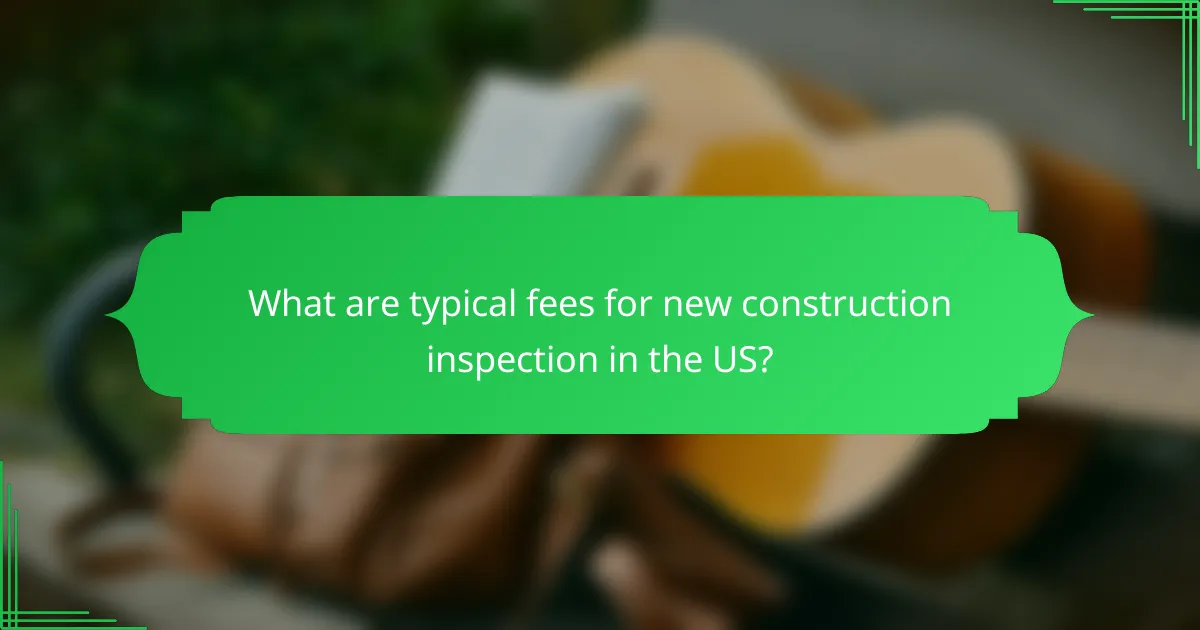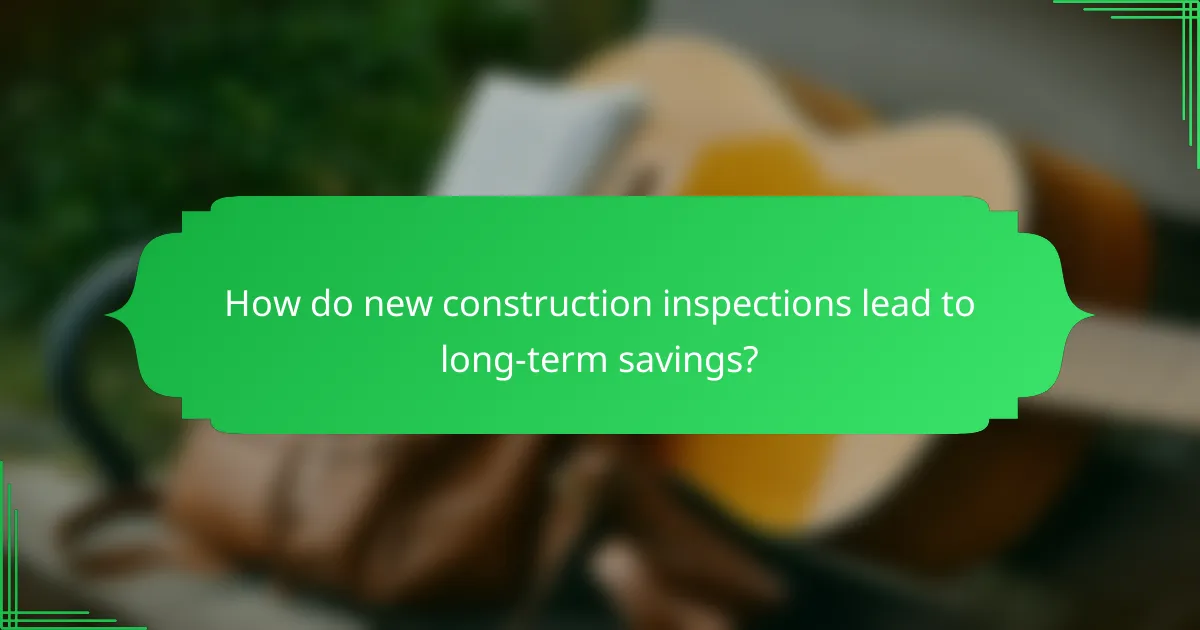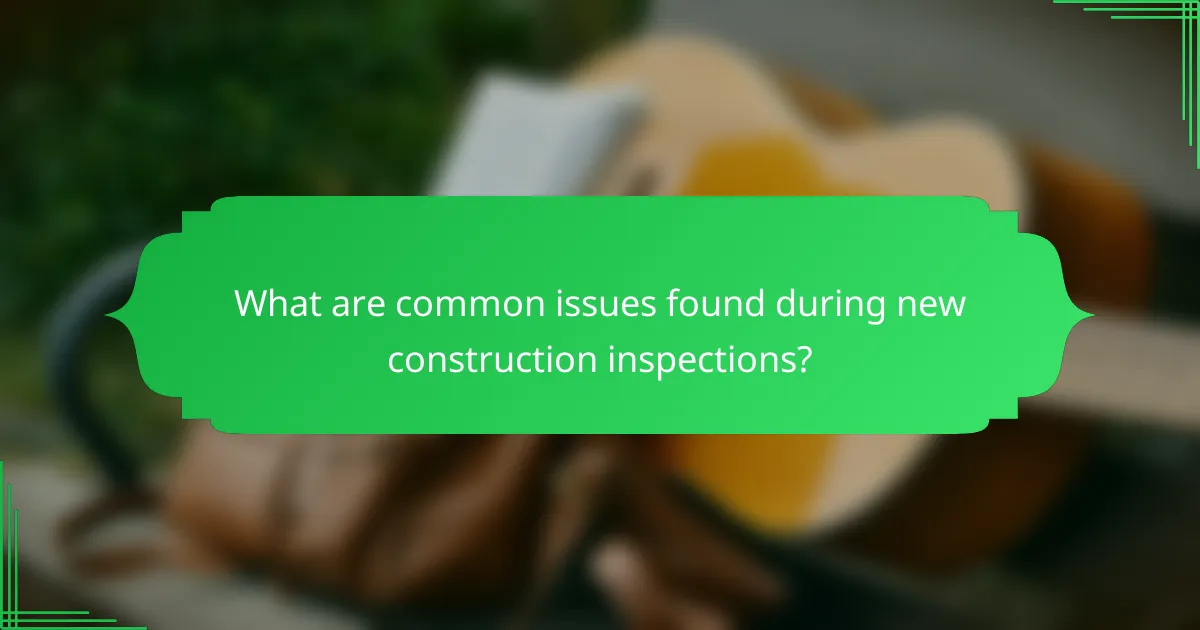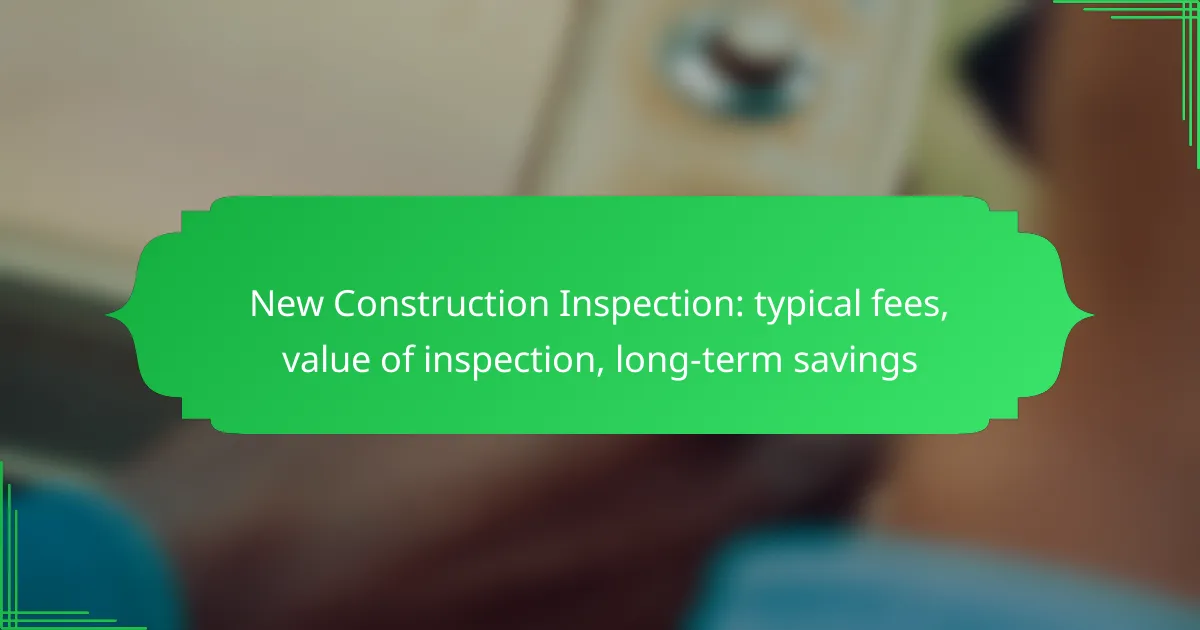New construction inspections are a crucial step for homeowners, offering insights into the quality and safety of newly built properties. While typical fees can range from a few hundred to over a thousand dollars, the investment often pays off by identifying potential issues early, ensuring compliance with regulations, and enhancing long-term property value.

What are typical fees for new construction inspection in the US?
Typical fees for new construction inspections in the US range from a few hundred to over a thousand dollars, depending on various factors such as the size of the property and the complexity of the inspection. Investing in a thorough inspection can save homeowners significant costs in the long run by identifying potential issues early.
Average inspection fees
On average, new construction inspection fees generally fall between $300 and $1,000. Basic inspections for smaller homes may start around $300, while larger or more complex properties can push fees closer to $1,000 or more. Specialized inspections, such as for plumbing or electrical systems, may incur additional costs.
Factors influencing inspection costs
Several factors can influence the cost of a new construction inspection. The size and type of the property are primary considerations; larger homes typically require more time and resources to inspect. Additionally, the inspector’s experience and qualifications can affect pricing, with more seasoned professionals often charging higher fees.
Other factors include the location of the property, as inspection costs can vary significantly between urban and rural areas. The specific services requested, such as thermal imaging or mold assessments, can also add to the overall cost.
Regional fee variations
Inspection fees can vary widely across different regions of the US. For example, urban areas like New York City or San Francisco may see higher fees, often exceeding $1,000 for comprehensive inspections. In contrast, rural areas might offer inspections for as low as $300 to $500.
It’s essential to research local inspection companies to understand the typical fees in your area. Comparing multiple quotes can help ensure you receive a fair price for the services rendered.

What is the value of a new construction inspection?
A new construction inspection provides essential insights into the quality and safety of a newly built property. It helps identify issues early, ensures compliance with regulations, and can enhance the long-term value of the home.
Identifying potential issues
A new construction inspection is crucial for uncovering potential problems that may not be visible to the untrained eye. Inspectors look for issues such as structural defects, plumbing leaks, and electrical problems, which can lead to costly repairs if not addressed early.
Common issues found during inspections include improper installation of materials, inadequate insulation, and poor drainage systems. Addressing these problems before finalizing the purchase can save homeowners significant expenses down the line.
Ensuring compliance with building codes
Compliance with local building codes is a key aspect of new construction inspections. Inspectors verify that the construction meets all necessary regulations, which can vary by region and municipality.
Failing to comply with building codes can result in fines, mandatory repairs, or even legal issues. An inspection ensures that the property adheres to safety standards, protecting both the homeowner and future occupants.
Enhancing property value
Investing in a new construction inspection can lead to enhanced property value over time. A well-inspected home is more likely to attract buyers and command a higher price in the real estate market.
Furthermore, addressing any identified issues before selling can prevent price reductions and increase buyer confidence. A property with a clean inspection report is often viewed as a more desirable investment.

How do new construction inspections lead to long-term savings?
New construction inspections can significantly reduce long-term costs by identifying issues early, enhancing energy efficiency, and lowering insurance rates. By investing in a thorough inspection, homeowners can avoid expensive repairs and improve their property’s overall value.
Preventing costly repairs
Regular inspections during the construction phase can uncover potential problems such as structural defects, plumbing issues, or electrical faults. Addressing these concerns early can save homeowners thousands of dollars in future repairs.
For instance, a small leak detected during inspection can prevent extensive water damage later, which could cost significantly more to fix. Homeowners should prioritize inspections at various construction stages to ensure all aspects are thoroughly evaluated.
Improving energy efficiency
New construction inspections can identify areas where energy is being wasted, such as poor insulation or inefficient HVAC systems. By rectifying these issues, homeowners can lower their utility bills and reduce their carbon footprint.
For example, ensuring that windows are properly sealed and insulated can lead to energy savings of 20-30% on heating and cooling costs. Investing in energy-efficient systems and materials during construction can yield substantial savings over time.
Reducing insurance premiums
Having a comprehensive inspection report can lead to lower insurance premiums, as insurers often provide discounts for homes that meet certain safety and efficiency standards. A well-inspected home is perceived as lower risk, which can translate to savings on monthly premiums.
Homeowners should discuss their inspection findings with their insurance provider to explore potential discounts. Regular inspections can also help maintain a good insurance record, further reducing costs over the long term.

What criteria should be considered when choosing an inspection service?
When selecting an inspection service for new construction, consider their experience, customer feedback, and the range of services they offer. These factors will help ensure you receive a thorough and reliable inspection that meets your needs.
Experience and qualifications
Look for inspection services with a solid track record and relevant qualifications. Inspectors should ideally have certifications from recognized organizations, such as the International Association of Certified Home Inspectors (InterNACHI) or the American Society of Home Inspectors (ASHI).
Experience in the specific type of construction you are dealing with is crucial. For example, if you are inspecting a commercial building, choose a service that specializes in commercial inspections and has a history of working on similar projects.
Customer reviews and testimonials
Customer reviews provide valuable insights into the quality of an inspection service. Check online platforms like Google, Yelp, or Angie’s List for feedback from previous clients.
Pay attention to both positive and negative reviews to gauge the service’s reliability and professionalism. Look for testimonials that highlight thoroughness, communication, and responsiveness, as these are key indicators of a good inspection service.
Service offerings and specialties
Different inspection services may offer varying specialties, such as energy efficiency assessments, mold inspections, or structural evaluations. Determine what specific services you need and ensure the inspector can provide them.
Additionally, inquire about the inspection process, including what is covered in the inspection report and how long it typically takes. A comprehensive report should include detailed findings, photographs, and recommendations for any necessary repairs.

What are common issues found during new construction inspections?
New construction inspections often reveal a range of issues that can affect the safety and functionality of the building. Common problems include structural deficiencies and electrical system problems, which can lead to significant costs if not addressed promptly.
Structural deficiencies
Structural deficiencies in new constructions may include issues like inadequate load-bearing walls, improper framing, or foundation problems. These can compromise the integrity of the building and lead to costly repairs down the line.
Inspectors typically look for signs of settling, cracks in walls, or misaligned beams. Addressing these issues early can save homeowners tens of thousands of dollars in potential repairs and ensure the building meets local building codes.
Electrical system problems
Electrical system problems can range from faulty wiring to inadequate circuit capacity. These issues pose safety risks, including fire hazards, and can disrupt the functionality of the home.
Common findings include improperly grounded outlets, overloaded circuits, and outdated electrical panels. Ensuring that the electrical system is up to code not only enhances safety but can also improve energy efficiency, leading to long-term savings on utility bills.
